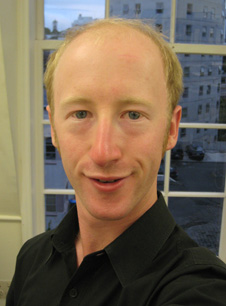 Alex has always had two passions: science and music. At Otago he played in bands while studying Physics, completing his Masters degree in 2007. His research involved using lasers to trap and cool atoms to very low temperatures. He then worked briefly for a company based on a commercial application of the research he'd done for his Masters.
Alex has always had two passions: science and music. At Otago he played in bands while studying Physics, completing his Masters degree in 2007. His research involved using lasers to trap and cool atoms to very low temperatures. He then worked briefly for a company based on a commercial application of the research he'd done for his Masters.
“I designed a set of mirrors that would effectively fold a very long laser beam into a very small space, bouncing the laser back and forth without crossing over itself. We were working on a hand-held device for detecting different gases, a clever thing that would be useful in dangerous places like underground mines.”
Then Alex moved to Auckland (the rest of the band had moved north… Alex had been in Dunedin for quite a while, and it seemed like a good time for a change! So he spent a bit of time working in cafes and doing music. After a while he decided he wanted to get back into work with a bit more science in it. He knew that a friend from Otago's Physics department worked at a place called Marshall Day Acoustics, so he walked in off the street and asked about a job.
“So I asked for a job, did some interviews and so on. What I didn't realise at the time was that one of the directors is the brother of the Physics Head of Department! So there were a few links already. I had never specifically studied acoustics, but since beginning work here I've been learning new stuff the whole time. Right now I'm doing a distance course in acoustics and vibration with the University of New South Wales.”
Marshall Day Acoustics does “anything to do with acoustics” – which can include helping to design concert halls and recording studios, preventing sound travelling between apartments, or predicting and reducing environmental noise levels from proposed new highways or airports.
Alex says his new job involves a lot more than just science: he's involved in meetings and researching legislation, writing reports, there's a bit of sleuthing involved in some jobs too! So his broader skills are coming into play.
“My degree taught me how to apply scientific method for conducting measurements, problem-solving, communicating ideas and presenting results… also I've just done a whole lot of learning for my Masters, so a pile more learning is not a problem!”
